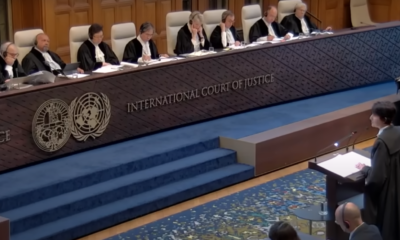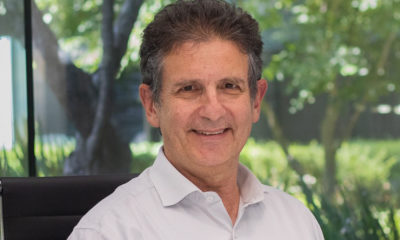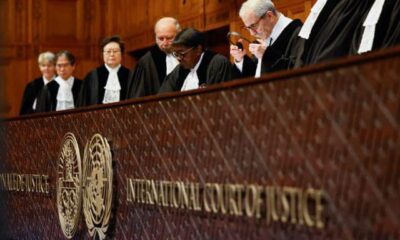
Israel

Why ICJ couldn’t order a ceasefire on Israel
The International Court of Justice (ICJ) couldn’t order a ceasefire in Israel’s war on Hamas because it would be binding only on Israel, but Israel isn’t fighting in a vacuum, Dr Mispa Roux, an expert in international criminal and human rights law told the Johannesburg Holocaust & Genocide Centre recently.
Roux, an education and research specialist in the fields of international criminal, human rights, and humanitarian law recently told the audience, “It would be extremely problematic if the ICJ had to order a ceasefire in Gaza. The ICJ makes binding decisions only against parties in front of the court. In other words, states that are party to that dispute. In this case, it’s South Africa versus Israel.”
Roux is a senior lecturer at the law faculty at the University of Johannesburg and project co-ordinator at the University of Pretoria’s Centre for Human Rights. “Judging by the three provisional measures that the ICJ has issued so far after South Africa asked for a ceasefire in Gaza, in which [the court] didn’t order a ceasefire, it indicates to me that the war in Israel is a justified war.
“It didn’t come out of nowhere. There was provocation – 7 October,” she said. Roux researches the early warning signs and indicators of genocide and crimes against humanity. In particular, she focuses on the prevention and prosecution thereof, and the question of state responsibility for these crimes and methods that may achieve justice for victims of international crimes.
“If there was a ceasefire ordered, only Israel would have had to lay down its arms. Hamas would then be able to continue as normal,” she said. “And at the ICJ, a group like Hamas, a non-state actor, is mostly viewed as a terrorist organisation. It won’t be able to appear at the ICJ. So, it will never be ordered to cease fire.”
Regarding the term “genocide” bandied about in relation to Israel’s war on Hamas, it links back to the Holocaust and what was done to the Jewish people during World War II, Roux said.
Genocide is “an internationally recognised crime where acts are committed with the intent to destroy, in whole or in part, a national, ethnic, racial, or religious group”, she said.
However, “The atrocities of the Holocaust and the genocide that was committed by the Nazis during World War II weren’t prosecuted as genocide. They were prosecuted as crimes against humanity because at the time, there wasn’t a word for it yet.”
The crimes against humanity that the Nazis were prosecuted for in the Nuremberg Trial were murder, extermination, enslavement, deportation, and other inhumane acts committed against any civilian group. This definition also covers any kind of persecution of a group of people on political, racial, or religious grounds.
“Gender-based violence and sexual crimes by the Nazis weren’t mentioned at Nuremberg. Nowadays, these are elements of the definition of crimes against humanity,” she said.
Today, Roux said, for something to be classified as genocide, the acts committed must fall into five categories. First, killing members of a group; second, causing serious bodily or mental harm to members of the same group; third, deliberately inflicting on the group conditions of life calculated to bring about its physical destruction in whole or in part and/or imposing measures intended to prevent births within the group; and forcibly transferring children of the group.
Roux said the watershed moment for international law to deal with crimes against humanity was World War II.
At the Nuremberg tribunal in August 1945, three criminal charges were laid: crimes against peace, which means waging a war which doesn’t have a reason or justification; war crimes; and crimes against humanity.
“In its shortest, simplest form, war crimes are violations of laws or customs of war,” Roux said. “This can be anything from using improper weapons, plundering cultural properties or religious buildings, or murdering hostages and ill-treating prisoners of war. It’s any devastation not justified by military necessity.”
Because of World War II and the atrocities that occurred in that period, the United Nations recognised that there needed to be a permanent place to hold people for such international crimes responsible, she said. From there, “ad-hoc tribunals” were set up in many parts of the world that aimed to hold the perpetrators of these crimes accountable, in particular in Rwanda, Yugoslavia, Sierra Leone, and Cambodia tribunals were set up to investigate the atrocities committed on state and individual level.
The International Criminal Court (ICC) was set up to have jurisdiction over any international crime happening in any of its 124 member states. “The jurisdiction of the ICC is genocide, crimes against humanity, war crimes, and crimes against peace,” Roux said.
She said there were only 17 cases currently before the ICC, and 10 out of those 17 involved the African continent. “The majority of these cases are only dealing with three of the four international crimes – crimes against humanity, war crimes, and crimes against peace.”
The ICC has only one arrest warrant for the crime of genocide – issued to former Sudanese President Omar Al-Bashir concerning crimes against the Fur, Masalit, and Zaghawa ethnic groups.
Up until the 1990s, the International Court of Justice (ICJ) heard disputes only between states – such as maritime or trade disputes or how diplomats should be treated.
“All of a sudden after the war in the Balkans – otherwise known as the Yugoslav wars from 1991 to 2001 – we started to see states starting to hold other states accountable for committing international crimes,” Roux said.
She said the ICJ’s jurisdiction is for state responsibility for breaches of international law.
There are presently eight cases before the ICJ dealing with international crimes. All of these cases include allegations of genocide, including South Africa’s accusations against Israel.
When asked what the point of these international cases was, Roux said, “We can’t have a defeatist attitude when it comes to crime, especially international crime. The wheels of justice move incredibly slowly, but they do turn, and people are brought to justice.”










